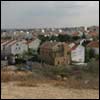My family and I live in Netivot, a city in the Western Negev, Israel's desert region. We are located ten kilometers from Gaza. Our neighboring communities are located within the regional councils of Sedot Negev, Eshkol, and Shaar HaNegev. The community of Sderot is about ten minutes away from us by car.
We have grandchildren who live in Ma'agalim, a Sedot Negev community, and they go to school in Kfar Maimon, which is also a part of Sedot Negev.
Each of the children's classrooms is a fortified bomb proof room with a security door. Before they moved into these classrooms, each class was in an unprotected classroom.
Children have Kassam drillsChildren in North America have fire drills; these children have Kassam drills. Every child knows that when the alarm goes off, they have to quickly go under their desk and roll up like a ball. They know they have to stay away from windows and follow the teacher's instructions. They understand this is not child's play. With these new classrooms, the children have protection from Kassams.
The army comes to the school to visit, teach and reassure the children. Next to the playground there are bomb shelters in case the siren rings during recess. Unfortunately, Kfar Maimon is on the receiving end of many Kassams.
We, in Netivot, have had several Grad missiles fall over the past couple of years. Kassams can't reach us as they cannot be aimed or reach farther than a few kilometers. Grads, on the other hand, are directed at, and can reach, places at a distance of up to twenty kilometers. They usually land in or near the cemetery where the Baba Sali is buried, which is on the perimeter of the city.
We have had Grads land in the center of town, near a gas station, in the shuk (market), and two have landed not far from our apartment. One was in a farmer's field; we could see the smoke rising from our balcony. The other was a little too close for comfort; it landed in a construction site just behind our apartment. Fortunately, there were no injuries or damage caused by these attacks.
Netivot, like other communities, is hooked up to a warning siren called "red alert." When the siren rings, it means you have forty-five seconds to go into your safe room or a public bomb shelter.
When the Kassam or Grad missile lands it makes a very loud boom, and the windows, and sometimes the floor, vibrate. It leaves a hole in the ground — deep and black.
We could see the smoke rising from our balconyLife goes on. We are not afraid to leave our apartment. We take buses, go where we have to go and do whatever needs to get done.
Living in this area, you get used to the different sounds. You get used to having helicopters hovering and circling over the neighborhood for hours, waiting for orders. You learn the sounds of booming in the distance, which are the terrorists attacking and the army responding.
By far, Sderot and the moshavim and kibbutzim close by have had the most attacks. Sderot can be targeted up to thirty to forty times a day. It is only two kilometers from Gaza. The property damage is extensive. Many residents have been seriously injured. One child lost his leg. Children and adults are suffering from mental anguish. There have been deaths among both children and adults. Parents are afraid to send their children to school, as the schools in Sderot are not fortified. Kassams have landed near kindergartens and day care centers. One Kassam landed in a synagogue, right beside the Ark, five minutes after the dedication of a new Torah scroll. Everyone had just left.
Unemployment is very high and despair is everywhere.
But with every tragedy there is sunshine. Mitzvot are happening all the time. People care.
In Beer Sheva there is a challah project, where people order their Shabbat challot from Sderot. This past spring, buses filled with women from Jerusalem and surrounding areas, came to Sderot to do their Passover holiday shopping. During the summer, a convoy of cars from the North came to visit the residents and shop.
The Sderot Online Mall is a private initiative of people from the center of the country, trying to give new business opportunities to the citizens of Sderot, as well as to the other moshavim and kibbutzim that are close to and surround the Gaza strip. The residents of Sderot have to know that they are not alone. And the above mentioned deeds try to help to ensure that.
As I sit at my computer typing this, I hear a very loud boom in the distance. When will it end.....?
May the Hand of the A-lmighty protect us all.
Postscript:
At 8:05 a.m. on the third day of Chanukah, as I was making breakfast, the siren went off. My family and I grabbed our dog and went to our safe room. My husband closed the metal protective window and— boom. This scenario repeated itself many more times that day. All day we could hear sirens and booms from a distance. At the end of the day the count was seventy Grads, Kassams and mortars. Many people suffered from shock. On Moshave Tekuma a Kassam went thru the roof and landed in a girl's bedroom. Thank G‑d she had just left the room. Businesses and cars were damaged everywhere.
My daughter, who lives in a settlement near us in Ma'agalin, has her safe room in the basement. She told her three oldest children (eleven, seven and six-years-old) that when they go downstairs each one has to take one of the younger children with them (two, three and four-years-old). Although the older children are used to sirens, Adi, the seven-year-old, was very scared that day.
This past Shabbat day, Shabbat Chanukah, December 26, 2008, we went to our safe room at least ten times. We have been under siege the entire day...
Home is suppose to be safe.








Join the Discussion